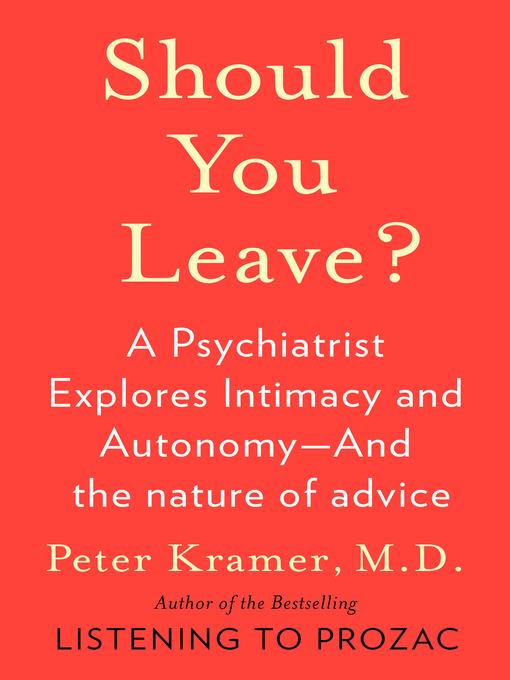
Should You Leave?
کتاب های مرتبط
- اطلاعات
- نقد و بررسی
- دیدگاه کاربران
نقد و بررسی

Starred review from September 1, 1997
Those who read Kramer's 1993 bestseller, Listening to Prozac, won't be surprised to find him occasionally flying the Prozac colors again in his latest, a self-described "odd hybrid of fiction, non-fiction and self-help." But Kramer generally limits his discussion of psychopharmaceuticals in this fascinating philosophical and psychological study of what makes relationships thrive or wither, concentrating instead on fictional case histories and an exhaustive review of 19th- and 20th-century theories of intimacy and community. When it comes to love, Kramer, a Brown University psychiatry professor who also has his own private practice, is a frank, but not unambivalent, advocate of sticking it out. He argues that couples who were compatible enough to commit to each other in the first place are probably well enough matched to succeed in the long haul as well, albeit not, in some cases at least, without some serious interpersonal spadework. In this he takes issue with the contemporary premium on autonomy, whose varying levels of boosterism he examines in everyone from Ralph Waldo Emerson, SYren Kierkegaard and Ann Landers to such analysts as Murray Bowen, Carl Rogers and Leston Havens. He also looks at some proponents of connectivity, including philosopher Stanley Cavell, analyst Carl Whitaker and 1970s feminist psychoanalyst Jean Baker Miller, who argued that "autonomy is a delusion." Even Kramer's excessive handwringing over both the inherent tackiness of relationship manuals and his profession's historic censure of advice-giving can't dilute the pleasure to be had from this thoughtful, finely nuanced work. Kramer is that rare psychoanalytic theorist who is as comfortable invoking Tillie Olsen as Freud, and his composite case histories have the verisimilitude and insight that is the hallmark of the best--and truest--fiction.

August 1, 1997
You've had enough--or so you think. But should you really leave? Kramer, author of the best-selling Listening to Prozac (LJ 5/1/93), examines how people seek an answer to this crucial question of the heart. Along the way he offers great insights into the human condition and helps the reader to understand why we each do what we do about interpersonal relationships on the brink of a breakup. The book is concerned with more than just answering the title's basic question. It also delves into the intricate and complicated issue of psychotherapy and advice itself. Kramer contemplates the role of the therapist as well as the unspoken law against offering advice to his clients. Written with a keen ear for narrative, this nonfiction title reads more like well-written fiction: smooth as silk. Highly recommended for both public library self-help and academic psychology collections.--Marty Dean Evensvold, Magnolia P.L., Tx.

July 1, 1997
Some surprise best-sellers are more surprising than others. Such was psychotherapist Kramer's last book, "Listening to Prozac" (1993). Although nontechnical, it wasn't exactly easy reading, and neither is its successor, which Kramer says was all generated from its very first sentence, "All you want is a simple piece of advice." That want is, for Kramer, essential to the psychiatric encounter, and its motive is contained in the second sentence, "There is a decision you must make--stay or leave." Thereafter, Kramer presents a series of couples, at least one of whose members is contemplating that decision. He uses his hypothetical treatments of the contemplators to explore how and on what bases therapists respond to requests for advice. The issues involved in such requests are of personal autonomy and interpersonal intimacy, and Kramer shows how some of the most influential therapeutic practitioners have addressed them and how their insights and techniques are employed by an everyday shrink, himself. Full of plenty of other insights garnered from literature and the social sciences, including even the work of primate ethologist Frans de Waal, Kramer's book about how psychotherapy works has much substance. It is easy to learn a lot from it, despite Kramer's discursive (really, rather gassy) style. ((Reviewed July 1997))(Reprinted with permission of Booklist, copyright 1997, American Library Association.)

























دیدگاه کاربران